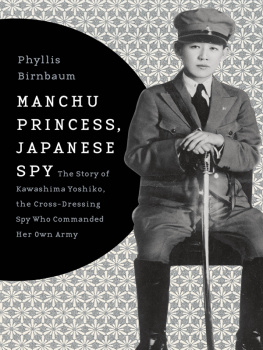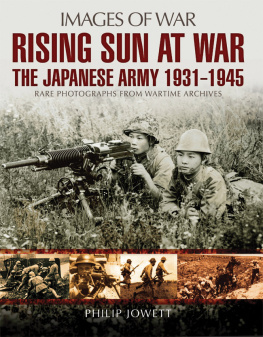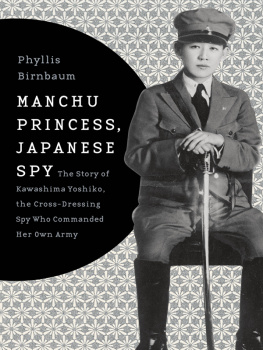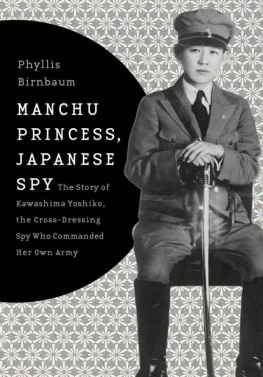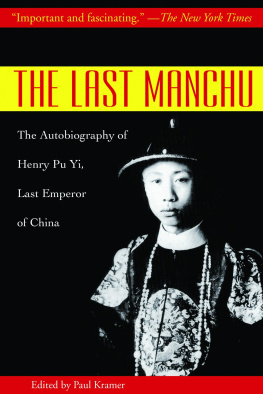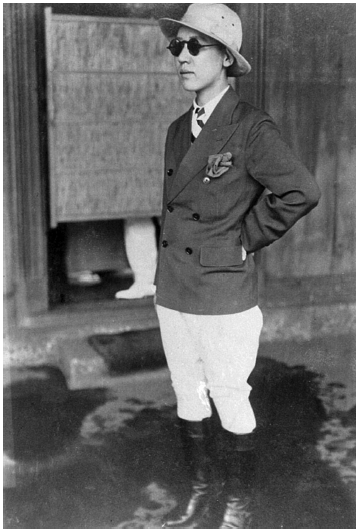MANCHU
PRINCESS,
JAPANESE
SPY
ASIA PERSPECTIVES
Weatherhead East Asian Institute,
Columbia University
Kawashima Yoshiko, around 1933 Courtesy Hokari Kashio
Phyllis
Birnbaum
MANCHU
PRINCESS,
JAPANESE
SPY The Story of
Kawashima Yoshiko,
the Cross-Dressing
Spy Who Commanded
Her Own Army
Columbia University Press
New York
ASIA PERSPECTIVES: HISTORY, SOCIETY, AND CULTURE
A Series of the Weatherhead East Asian Institute, Columbia University
CAROL GLUCK, EDITOR
Comfort Women: Sexual Slavery in the Japanese Military During World War II, by Yoshimi Yoshiaki, trans. Suzanne OBrien
The World Turned Upside Down: Medieval Japanese Society, by Pierre Franois Souyri, trans. Kathe Roth
Yoshimasa and the Silver Pavilion: The Creation of the Soul of Japan, by Donald Keene
Geisha, Harlot, Strangler, Star: The Story of a Woman, Sex, and Moral Values in Modern Japan, by William Johnston
Lhasa: Streets with Memories, by Robert Barnett
Frog in the Well: Portraits of Japan by Watanabe Kazan, 17931841, by Donald Keene
The Modern Murasaki: Writing by Women of Meiji Japan, ed. and trans. Rebecca L. Copeland and Melek Ortabasi
So Lovely a Country Will Never Perish: Wartime Diaries of Japanese Writers, by Donald Keene
Sayonara Amerika, Sayonara Nippon: A Geopolitical Prehistory of J-Pop, by Michael K. Bourdaghs
The Winter Sun Shines In: A Life of Masaoka Shiki, by Donald Keene
FOR ASHOK
CONTENTS
Chizuko: Yoshikos assistant
Doihara Kenji: notorious agent provocateur of the Kwantung Army, whose many dark acts furthered Japanese advances in China; said to be one of Yoshikos financial backers
Fuku: Yoshikos adoptive mother; wife of Kawashima Naniwa
Fukunaga Kosei: only surviving daughter of Hiro and Pujie
Ganjurjab: son of Mongol military leader Babujab; married Yoshiko in 1927
Harada Tomohiko: Naniwas relative, who knew Yoshiko in her youth
Hiro: see Saga Hiro
It Hanni: speculator, Yoshikos lover
Iwata Ainosuke: ultranationalist activist and Yoshikos onetime suitor
Jin Bihui: another name for Kawashima Yoshiko
Jin Moyu: Yoshikos younger sister
Kamisaka Fuyuko: author of 1984 biography of Yoshiko
Kawashima Naniwa: Yoshikos adoptive father
Kawashima Renko: Yoshikos niece; adopted by Kawashima Naniwa
Kawashima Shko: Yoshikos grand-niece, Renkos daughter
Kawashima Yoshiko: also known as Aisin Gioro Xianyu, Eastern Jewel, Radiant Jade, Jin Bihui
Kosei: see Fukunaga Kosei
Mariko: Yoshikos fictional counterpart in Muramatsu Shfs novel The Beauty in Mens Clothing
Matsuoka Ysuke: foreign minister of Japan 19401941
Moriyama Eiji: ultranationalist and Yoshikos onetime suitor
Muramatsu Shf: author of best-selling novel about Yoshiko, The Beauty in Mens Clothing
Muramatsu Tomomi: Muramatsu Shfs grandson; also wrote about Yoshiko
Naniwa: see Kawashima Naniwa
Ogata Hachir: Yoshikos assistant in the latter part of her life
Prince Su: Yoshikos father; also known as Shanqi
Pujie: younger brother of Last Emperor Puyi; husband of Saga Hiro
Puyi: last emperor of the Qing dynasty
Renko: see Kawashima Renko
Saga Hiro: aristocratic Japanese wife of Pujie
Sasakawa Ryichi: controversial entrepreneur and Yoshikos benefactor
Shf: see Muramatsu Shf
Shko: see Kawashima Shko
Sonomoto Kotone: became close friend of Yoshikos in 1939, in Fukuoka
Su Bingwen: warlord who staged a rebellion against the occupying Japanese
Tada Hayao: officer in Kwantung Army, Yoshikos lover
Tanaka Rykichi: officer in Kwantung Army, Yoshikos lover
Terao Saho: author of 2008 biography of Yoshiko
Tomomi: see Muramatsu Tomomi
Tyama Mitsuru: prominent ultranationalist leader of Genysha, a group dedicated to Japans expansion
Wanrong: Puyis wife
Xianli: Yoshikos older brother
Yamaga Tru: Yoshikos first love; later worked for Japans Special Service Agency
Yamaguchi Yoshiko: famed singer-actress, known in China as Li Xianglan and in Japan as Ri Kran
Zhang Zuolin: also known as Chang Tso-lin; powerful warlord assassinated by the Japanese in 1928
| 1865 | Birth of Kawashima Naniwa, Yoshikos adoptive father |
| 19041905 | Russo-Japanese War |
| 1907 | Approximate date of Yoshikos birth |
| 1911 | Revolution in China brings down the Qing dynasty |
| 1912 | Republic of China established, Qing emperor Puyi abdicates |
| Prince Su and family flee from Beijing to Lushun |
| 1915 | Approximate date of Yoshikos arrival in Japan as Naniwas adopted daughter |
| 1922 | Death of both Yoshikos father, Prince Su, and her mother |
| 1925 | Puyi flees from Beijing to Japanese concession in Tianjin |
| 1927 | Yoshiko marries Ganjurjab |
| 1928 | Warlord Zhang Zuolin assassinated |
| 1931 | Manchurian Incident |
| Puyi leaves Tianjin for Manchuria, soon joined by his wife, Wanrong |
| 1932 | Shanghai Incident |
| Establishment of Manchukuo |
| Warlord Su Bingwen seizes a railway line in Manchukuo, leading to Hulunbuir Incident |
| 1933 | Battle of Rehe |
| The Beauty in Mens Clothing published |
| 1937 | Start of Sino-Japanese War |
| 1940 | Japan signs Tripartite Pact with Germany and Italy |
| 1941 | Japanese-Soviet Neutrality Pact signed |
| Pearl Harbor |
| 1945 | Soviets invade Manchukuo |
| Japanese defeated in Second World War |
| Yoshiko arrested |
| 1948 | Yoshiko executed in Beijing |
C hinese and Japanese names are generally written with the family name first, followed by the given name. I usually refer to individuals by their family names, but in cases where a family name can refer to more than one person, the given name is used. For example, Kawashima Yoshiko is usually referred to as Yoshiko; Aisin Gioro Xianli is referred to as Xianli.
For Chinese people and places Ive generally used the pinyin system of romanization, except for those better known in other forms, for example Chiang Kai-shek. In the few quotations from older English-language works and translations, Ive kept the Chinese and Japanese names and places as printed in the originals.
Chinese and Japanese traditionally count their ages using a system different from the one used in the Westa child is one on the date of birth and two the following New Years Daybut they now also use the Western system. Frequently it is hard to determine which system is being used. For this reason, I have left the ages as cited in the original documents. Yoshikos age is particularly difficult to determine, with many different dates cited by contemporaries and biographers.
I dont want to die with humans. But Ill be happy if I die with monkeys. Monkeys are honest. Dogs too.

